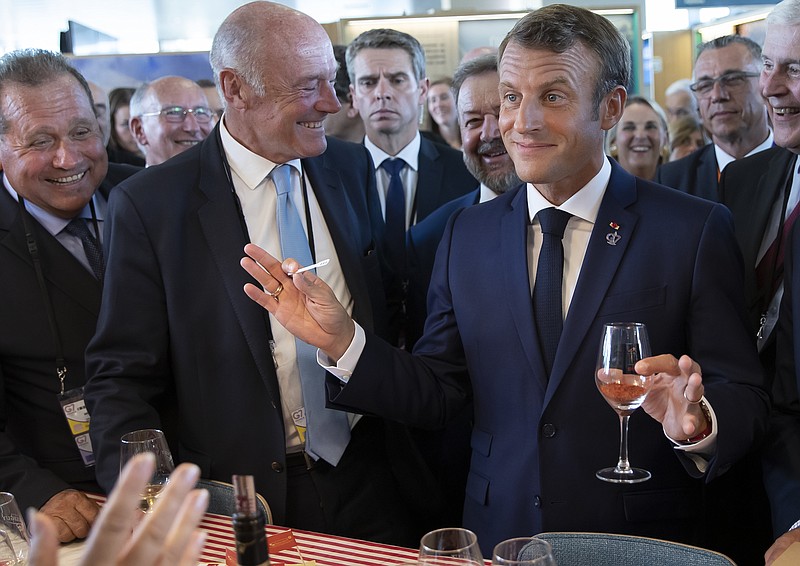BIARRITZ, France (AP) — The posturing by leaders of the G-7 rich democracies began well before they stood together for a summit photo.
French President Emmanuel Macron, the host, cornered Donald Trump at the American leader’s hotel with an impromptu lunch invitation. It was something of a power move by Macron, who pushed the Amazon wildfires to the top of the agenda at a summit Trump hoped to use to persuade allies they can avoid economic disaster by following his low-tax, low-regulation mantra.
European Council President Donald Tusk and British Prime Minister Boris Johnson traded barbs over who would go down in history as “Mr. No Deal” and take the blame for a Brexit departure from the European Union that threatens to go off the rails.
And nearly everyone kept a trade threat close at hand.
Just before boarding Air Force One for France, Trump tweeted another threat of new tariffs on French wine in retaliation for France’s digital services tax. Macron greeted him warmly as a “very special guest,” but had already called for an end to the trade disputes he said threatened global growth.
Tusk said the three-day summit in the seaside resort of Biarritz would be “a difficult test of the unity and solidarity of the free world and its leaders.” For a meeting where the disputes traditionally happen in private, the results were looking grim.
Even as Tusk, who presides over the council of leaders of the 28-member European Union, said the last thing the bloc wanted was a trade dispute with the United States and called for “an end to trade wars,” he promised to retaliate against U.S. products if Trump carries through on the wine tariffs.
Macron has said the summit would not end with a final statement, as he had little expectation Trump will agree to anything about fighting climate change even as the issue shot to the top of the agenda with the widespread fires in the Amazon. He already rejected Trump’s request to let Russia rejoin the group five years after being expelled over its seizure of Crimea. And he is trying to hold together the European line on the Iran nuclear deal over U.S. objections.
“We have disagreements, and at times there are caricatures. But I think that the great challenges that we have: Climate, biodiversity, the technological transformation, the fight against inequality, this global insecurity, we will only resolve them by acting together, by reconciling,” he said.
But sitting across from Trump ahead of their unscheduled two-hour lunch, Macron said he hoped to lead Europe toward lowering taxes, in an acknowledgement that fiscal stimulus could blunt a coming recession. He warned against escalating trade disputes, even after threatening to block an EU trade deal with several South American states, including Brazil over the Amazon fires.
Ireland joined in the threat. German Chancellor Angela Merkel disagreed, with her office saying Saturday blocking the deal with the South American trade bloc, Mercosur, won’t reduce the destruction of rainforest in Brazil, although she backed Macron’s proposal to discuss the fires at the summit.
At last year’s summit in Charlevoix, Canada, Trump left early and repudiated the final statement in a tweet from Air Force One. This year, Macron said, there will be no final statement.
Instead, diplomats said Macron could issue his own summary of the discussions.
Lowered expectations are nothing new for the G-7, but this year’s intent seems to be just to avoid diplomatic catastrophe, salvage the possible, and show voters that their leaders have a role on the world stage. One force that could push leaders together is their joint vulnerability to an economic slowdown, especially the ones who, like Trump, are facing elections in the next year or two.
Disputes on trade have unsettled the global economy because businesses don’t know where tariffs will be imposed or what the trading system will look like in a world that has become dependent on supplies of materials, parts and goods flowing through intricate cross-border supply chains.
Given lowered expectations, the most important summit outcome would be “to do no harm,” said Holger Schmieding, chief economist at Berenberg Bank in London. “Have a discussion without a bust-up, no repeat of Charlevoix, please.”
A “dream result” would be the EU, U.S. and Japan agreeing to jointly tackle their trade issues with China, but “with America-First Trump that seems too much to hope for,” he said.

